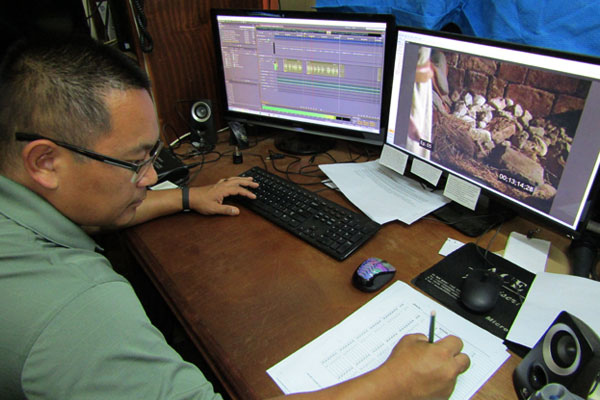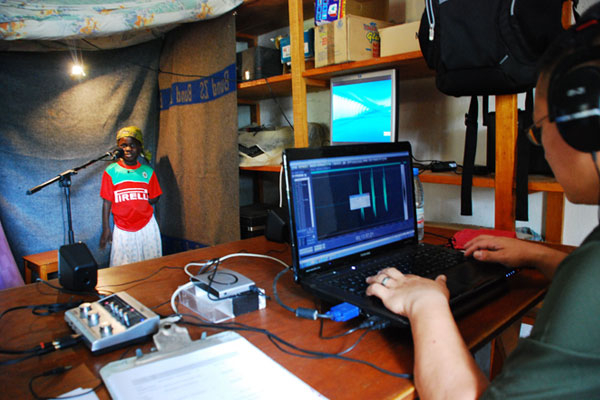Sharing Hope Through Vernacular Media

“What does this recording mean to you?” Nathanael Gregoriev asked a group of translators in a remote village in Cameroon.
Together, they had been working on a film about the Gospel of Luke in six local languages. Many people in the world are oral learners and respond to the gospel when it’s presented to them in an oral format. Vernacular media specialists such as Nathanael and his wife, Darla, work hard to make God’s Word accessible to people through audio and film formats.
An older translator responded to Nathanael’s question: “You know, I went through Bible school. I took all the translation courses. I even preached on this passage of Scripture. But I never truly understood what Jesus went through to die for my sins until I saw him do it and heard him speak my language. I heard him say in the film, ‘Father, forgive them, for they know not what they do.’ It was at that moment, I truly understood what Jesus went through. If this can impact someone like me, who has preached on these passages for so many years and translated, how much more will this speak to other people who haven’t heard it before?”
An Open Door
Missions and vernacular media are part of Nathanael’s family and their legacy. His parents served as vernacular media specialists with Wycliffe in Brazil and Colombia, where Nathanael grew up.
When Nathanael and Darla started praying about serving in missions, they were drawn back to Wycliffe. Fascinated by vernacular media, they expected to serve in either Asia or South America, but God had other plans. One by one, doors kept shutting until only a position in Africa was left open. “Africa was the last place on our list,” Nathanael laughed. “But we prayed about it and decided that yes, we were supposed to serve in Cameroon. … We felt so blessed that God had a hand in the process and guided us so clearly.”

Now Nathanael serves as the manager of national language media services for seven countries in Central Africa. Much of his work is focused on dubbing the “JESUS” film as well as a film about the Gospel of Luke into local languages; so far he has been involved in over 34 dubbing projects!
In addition, he and Darla also record Scripture and build apps. “Vernacular media assists every domain,” Nathanael explained. “It can help translation, literacy, Scripture engagement, linguistics and more. It's very exciting! … For example, when translators hear recorded Scripture, they might realize the words don’t sound as clear or natural as they intended, and they can refine the translation.”
No One Left Out
Recording and showing the Luke and “JESUS” films often comes with its own challenges. In one remote village, Nathanael seemed to keep running into roadblocks. First, it started pouring rain the moment the team set up their recording studio; the rain caused a racket and dangerous leaks near all the recording equipment. Then, when time came to finally show the video to the village, the village facilitator’s computer had technical difficulties, and the language team decided to send everyone away.
Nathanael and his friend Lance had been driving nearly 10 hours to reach the village for the video launch when they received a phone call with the terrible news. “No, don’t send everyone away!” Nathanael begged. “Please just wait! We’re almost to your village. We’ll look at it then.”
Thankfully, Lance had brought his own computer, and once in the village, they were able to set up a working video. Several village kids began running around, calling everyone to come back and watch. Soon a group of nearly 100 people showed up, crowding into the church and even peering in through the windows. For the next four hours, the crowd was completely silent, transfixed by the images of Jesus on the screen.

That village, along with many others like it throughout Africa, is now home to civil unrest. Translation teams haven’t been able to work directly in those areas, but the films that Nathanael helped to produce are still changing peoples’ lives.
“We’ve heard stories where people will have to flee ... and at night, they will huddle together and pull up the Luke video and watch it on their phones,” Nathanael said. “It brings them comfort to know that God is watching over them. [When fleeing] they can’t necessarily grab their New Testament, but they have their phones. And they can listen to portions of their translated New Testament and watch the “JESUS” or Luke films and share hope with other people.”
Nathanael concluded: “We don’t want to see anyone being left out of getting God’s Word. We want people to have access to God’s Word in [a] way that they understand.”
Learn more about the impact of vernacular media and audio Scriptures in this video!






